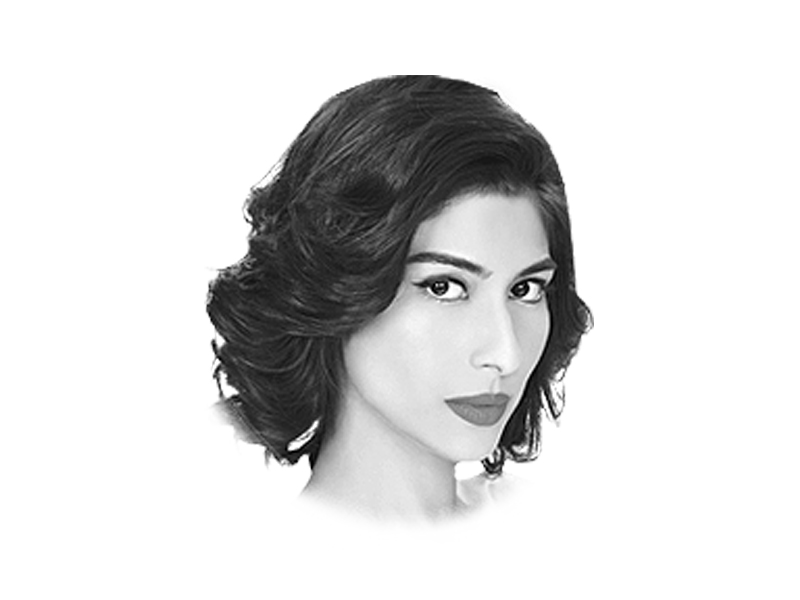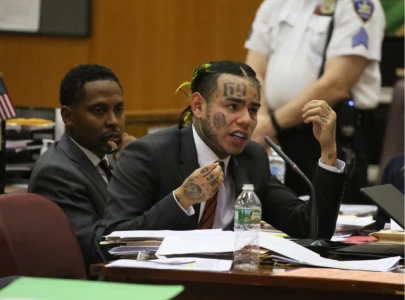

I hadn’t expected much from this meeting professionally to be honest. When I got a call saying I had been cast, it was like a wish I hadn't even dared imagine could come true. It felt too good to be true and for a while I even believed that it was, because between the time that I met Mira and the time I got a casting confirmation, I had learnt that I would be becoming a mother and probably wouldn't be able to shoot according to the film's schedule. As luck would have it, there were other delays. In the end, Kate Hudson and I were both extremely new mommies when we shot the film. It reaffirmed my belief in things happening when they're meant to.
My work was based mostly in Delhi. I wish more scenes for the movie could have been shot in my beautiful city of Lahore as originally planned. We would arrive at base camp, which would be set up from scratch every night near the given location, for breakfast and then into our trailers for make-up and costume. Unfortunately, the difference between the film industries in Pakistan and India is vast and there is no fair comparison that I can make between shooting there and here. We have years of catching up to do. Their industry has had uninterrupted decades to evolve and grow. Whether its technology, professionalism, work ethics, punctuality or even skill, practice makes perfect. Even though they are such senior actors, Om Puri and Shabana Azmi would be on set at the crack of dawn: punctual, hardworking, well-rehearsed and ready to go. It’s all about working hard, and that too consistently. There are no shortcuts to being brilliant. The one strength Pakistan has is talent, which is why we must support it every step of the way.
The experience was very intense. Working on a major movie day in and day out, with the same people while you’re away from home is like living with a new family. You can also compare it with being at camp. It takes a while to snap out of it and get back to real life.
When it comes to the character I play in the movie — Bina — she is an essential reflection of what Lahori girls are like. Boisterous, feisty, expressive and full of spirit. It was easy to connect with her because the character, written especially for the movie, was quite close to my heart and easy to relate to. I think Bina is significant in showing global audiences a fun, progressive and independent side of Pakistani girls.
My family in the film is so similar to my own in real life that the similarity is uncanny. It is a literary, progressive and extremely cultured family. Shabana Azmi captured the Lahori ammi perfectly. She is grace personified and has presence and an aura about her. She is one of the few Indian actresses who can do justice to an Urdu role as opposed to a Hindi one. Her theatre experience and command over the Urdu language is rarely found across the border.
After working with Om Puri, I realised that he was a complete natural. I’ve seen excellent performances by him previously, but to see them on set while in the middle of a riveting scene is a great experience. Similarly, working with Riz Ahmed was a real treat. He's got razor sharp wit and an even sharper mind and is extremely talented.
The names who were working behind the camera were very accomplished people in a league of their own. It was one of those rare experiences when you are truly surrounded by professionals who, despite being brilliant at what they do and being the best in the business, are hard-working, organised, as well as encouraging and warm.
When it comes to Mira Nair, I must say that she exudes warmth that touches all those she works with. The fact that most of her team has been with her for over 20 years is testimony of this very fact. After a harrowing all-night shoot, a day before I was coming back, she took out half an hour out of her extremely busy schedule and left a parcel of presents in my trailer for my daughter! No matter what the stress levels, no matter what the situation, I never once saw her lose her cool or focus. Being directed by Mira Nair is a dream come true. She was definitely the biggest star on set
Even if I had absolutely nothing to do with this movie, the fact that Mohsin Hamid wrote a book set in my Lahore and none other than Mira Nair made a movie out of it is unbelievable. The thought of sitting in a cinema, watching a Mira Nair movie which starts with the words “Lahore, Pakistan 2001-2011” gives me goose bumps. Surreal!
Published in The Express Tribune, May 30th, 2013.
COMMENTS (32)
Comments are moderated and generally will be posted if they are on-topic and not abusive.
For more information, please see our Comments FAQ











@kaalchakra
"The issue of authenticity is authentic. I just wish the movie had a Pakistani director, Pakistani actors, and Pakistani dresses. My views are only about authenticity, nothing else."
You have nailed it. This dicotomy of authenticity started from the top i.e the director. If only the director was a Pakistani everything else would have fallen in the right place; location, artists, costume, set interior, make-up van, food, accomodation and transport for the artists and the crew members.
@gp65: bro..i completely agree with you.. yess indeed urdu is actually a sub-continental language, its a beautiful language.. i know that people from delhi, culcutta and some more "old" cities have first language as urdu..but urdu got more boost after pakistan was made.
@URDU: "plus the genuine Urdu is actually a language who an average indian cannot understand trust me the language in bollywood movies and as far as i have experienced meeting indian they cant speak pretty good urdu. and u wont understand the script too "
Bollywood movies do not claim to be in Urdu, so it is not relevant that Urdu is not used. They are Hindi movies but technicaly the language they use is Hindustani. Moreover while you are correct that the average Indian would not understand high flowing Urdu or the Udu script, I do not believe @SM was talking about an average Indian being proficient in Urdu. He stated (and quite correctly) that there are millions of Indians whose first language is indeed Urdu. India also has many Urdu medium schools - so the notion that Urdu script is not understood anywhere in India is not accurate.
you see urdu is a universal language.. according an urdu expert urdu is gradually fading away in india but in pakistan due to its position as a national language it is pretty much on the rise.... plus the genuine Urdu is actually a language who an average indian cannot understand trust me the language in bollywood movies and as far as i have experienced meeting indian they cant speak pretty good urdu. and u wont understand the script too
anyways this language took a considerable period of time develop as the historian say it was not a language for a particular sect of people but was considered a darbari or a royal language used as a communication language between the royals and the peasants.. it was developed in different places and then was combined to make a language called Urdu (the word urdu comes from turkish language meaning "army").
so pakistani are way more fluent in urdu that rest of the subcontinent because i dont think rest of the people know the pure urdu that is/was spoken before.. i know some people from delhi an who speak great urdu but that is also fading away.. the urdu u know is waaaayyy different from the actual urdu that pakistani speak.
nevertheless i am not trying to create differences i think urdu is a great and a very beautiful language..
and here u can also see Meesha Shafi again making my country proud... now i wont be surprised because this girl has immense talent.. come on have anyone heard her sing rock music, the her acting and her grace in modelling and the singing pop music..woohha she is uniquely talented
and for all those who think this movie should be purely pakistani, please be happy this is a gift to pakistan by foreign and local people, so accept it this way... plus there are actually alot of great movies coming out in pakistan that i cant wait to watch..hopefully this will be a breakthrough for our industry and i think will surpass the bollywood industry in pakistan or maybe internationally in the near future (this is what the critics say after they saw some trailers of the upcoming pakistani movies)..
Can their be anything which is purely Pakistani which is shot in pakistan with only pakistanis!! Someone should take a first step to make our industry grow so we dont always have to relay on indians to help us in everything like commercials and films!! Why cant we stand on our feet and do things on our own!
@Andy: Dear Our story is different from North america and Europe and We dont share the same culture and Language . India is our traditional rival from the beginning and look what indian government always do with Pakistan and their media always bashing Pakistanis for everything! How can we work together in situations like these..... Indians always support whatever their govt does with Pakistan whereas we always watching their movies praising their actors and dont see what they really have done to us..!!
@ Mansoor: this has nothing to do with Pakistani Nationalism, it has to do with authenticity. I'm not nit-picking, but the first scene has a man listening to a Qawwali in Lahore. He's wearing a Kurta-Pyjama, for heaven's sake. That's as glaring an error as the wine being served from a bottle at the Mariott Hotel in Islamabad in Zero Dark Thirty. The Director, Katherine Bigelow got a lot of stick for this, why shouldn't Mira Nair?
@shameema: they might not look Pakistani to you, but this movie is not a Pakistani movie, made for Pakistani audiences. It's much bigger than that, and for the rest of the 99% of the world that is going to watch the movie, they not reason to think otherwise. Just because they're telling a story based in Lahore doesn't mean they have to cast Pakistani, why should they compromise? Ms Azmi and Mr Puri after far superior actors than anything Pakistan can produce. Soch aur dil bara Honda change. Think big, think global, don't think Pakistani.
My only grouse against the film was the casting of Shabana Azmi and Amrish Puri. Somehow they just didn't look the part...or resemble the children. I realise that both names are extremely marketable but surely Mira Nair could have gambled with some pakistani actors. The likes of Rahat Kazmi, Javed Shaikh, Talat Husasain, Saira Kazmi, Atiqua Odho or even Meesa Shafi's mother, Sabah Hameed come to mind. It would have lent the film an air of authenticity, missing from the film as it was shot in Delhi not Lahore. This was sadly evident in the crowd scenes too. Despite these shortcomings, it was an excellent film. Riz Ahmed is a star!
My only grouse at The Reluctant Fundamentalist which is a brilliant adaptation of an equally brilliant book was the casting of Shabana Azmi and Amrish Puri as the Lahori parents. They just didn't fit the part or look remotely like the characters whose parents they were supposed to be. I do realise that these are household names and extremely marketable in India but surely Mira Nair could have used Pakistani actors...Talat Hussain, Rahat Kazmi, Javed Sheikh, Saira Kazmi, Atiqa Odho or evenMeesa Shafi's own mother, Sabah Hameed? Also in the crowd scenes, the people just don't look Lahori at all. Nevertheless, it was a good film. And very exciting too.
Pakistanis always must complain? is this a blog or an op-ed really? Do you guys have way too much time on your hands if so there are millions of causes in Pakistan that can use your help than your ridiculous time you spend on ET to monitor their material that said this film
@Kaasma Dadabhoy:
hahahahaha I find it hilarious that you, an Indian, are complaining about that comment, claiming that 'Pakistanis' are always complaining, yet that comment came from a regular poster from India.
Egg meet face.
I am glad the Author treasures and values her experience while shooting for the film.
I enjoyed this piece - written by a beautiful, young woman, straight from the heart and without inhibition. Put these qualities into your acting and you will go far.
@ Babloo Both of your comments are completely off topic. I am guessing you haven't read the book, so you have no idea the nature of 'fundamentalism' the book talks about.
A very painful read...
Babloo, Mira Nair was speaking of herself. To believe in the fundamentals is a matter of pride.
The fundamentalists of Pakistan are anything but reluctant. In fact 'reluctance' is not in their dictionary.
Well said Ms Meesha. This is a great example of working together, sharing expertise and prosper. If European and North American countries can work together why not us especially when we speak same language and share same culture.
Looks like another one of those movies where (non) Islamic extremism is used to defame Islam in the rebound
Pakistanis always must complain? is this a blog or an op-ed really? Do you guys have way too much time on your hands if so there are millions of causes in Pakistan that can use your help than your ridiculous time you spend on ET to monitor their material that said this film .."The Reluctant Fundamentalist" I consider a labor of LOVE from India & Pakistan with a dash of the elite of Hollywood. The glory of the greatest city Lahore was shown as much as Mira could given the restrictions goes to prove that Pakistanis need to ask themselves what can we do to make it secure in all cities so that film makers can come and share with the world the beauty of the landscape called Pakistan. But alas am I dreaming....? Pakistanis would rather groan & moan and find the negative aspects of life and seem quite please to leave the quagmire of a declining nation.
@SM
You are quite right in your comments on Urdu.
badly written piece, dripping of self importance. Obviously her working experience was extremely shallow to say the least which reflects in her writing.
Mira Nair is a great director and personality. However I think "Reluctant Fundamentalist" is a entirely misleading characterization of Pakistan and its fundamentalists. It should have been titled "Over eager and zealous fundamentalist" to do justice to the history of Pakistan and its role in inculcating and spreading religious extremism.
Why no mention of Keefer Sutherland ????
Misha Shafi is fabulous, Mira Nair is brilliant, in the Indian film industry Om Puri and Shabana Azmi stand tall and Mohsin Hamids book was good. I have not seen the movie as yet but look forward to doing so. Agree with Gp65 this should not be in the Opinion section.
I dont want to be unfair, but Urdu is essentially an Indian language. It was developed in what is now UP. And your comment "Her theatER experience and command over the Urdu language is rarely found across the border." is confusing to say the least. If it means people with command on urdu is not found in India, then you are, to the very least ignorant because India is filled with people who speak urdu as their mother tongue and therefore 1st language. If you are referring to Pakistan, then I am not sure what to say, because it is after all Pakistan's national language. Otherwise I did like your working experience. Hope you had a good time in India.
@jerseybb: "I agree with the author that the movie itself should be shot more in Lahore than it’s done in Delhi"
Mira could not get any insurance for her caste and crew to shoot in Pakistan. She had no choice...
Meesha, you are stunning.
Once in a while one comes across a piece of writing that's coming straight from the heart. Thanks Meesha Shafi for sharing your experience of shooting in India. Your performance in Coke studio Pakistan made great impression on this side of the border too. Wish you loads of success in future.
This should be a blog. Why is this in the OpEd section?
I have read the book, and I am eager to watch the movie now. I agree with the author that the movie itself should be shot more in Lahore than it's done in Delhi.